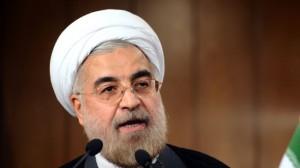 President Hassan Rouhani says Iran is committed to negotiating on its nuclear energy program in good faith, and wants to resolve the issue soon.
President Hassan Rouhani says Iran is committed to negotiating on its nuclear energy program in good faith, and wants to resolve the issue soon.Rouhani made the remarks during an address at a think tank forum in New York on Thursday, shortly after the foreign ministers of Iran and the six major world powers held �substantial� talks at the UN headquarters.
"We are fully prepared to seriously engage in the process toward a negotiated and mutually agreeable settlement and do so in good faith and with a business-like mind," Rouhani told the Asia Society and Council on Foreign Relations.
"We hope that this positive step that has been taken as a first solid and strong step will help us continue talks," he added.
"We think that a speedy settlement will support both sides," Rouhani said. "The sooner the better."
Earlier in the day, EU foreign policy chief Catherine Ashton said Iran and the P5+1 group -- Britain, China, France, Russia, and the United States, plus Germany -- held substantial talks at the UN, setting the stage for a new round of negotiations next month to resolve the West�s dispute with Tehran over its nuclear energy program.
"It was a substantial meeting, good atmosphere, energetic. We had a discussion about how we would forward with an ambitious timeframe to see if we could make progress quickly," Ashton said, appreciating Iranian Foreign Minister Mohammad Javad Zarif for talking so "openly."
"We have agreed to meet in Geneva on the 15 and 16 of October to pursue the agenda, to carry on from today's meeting and to hopefully move this process forward," Ashton stated.
"We want to spend our time in Geneva translating that into the practical details," she said, adding, "I am very ambitious for what we can do, but we all know we have to be very practical."
The EU foreign policy chief also said that Iran could either respond to the proposals of the P5+1 group or offer its own before next month's talks.
Iran and the P5+1 have held several rounds of talks on a range of issues, with the main focus being on Tehran�s nuclear energy program.
The two sides wrapped up their latest round of negotiations in April in the Kazakh city of Almaty. An earlier meeting was held in Almaty in February.
The United States, Israel, and some of their allies have repeatedly accused Iran of pursuing non-civilian objectives in its nuclear energy program and have used the unfounded accusation as a pretext to impose illegal sanctions on the Islamic Republic.
Iran rejects the allegations, arguing that as a committed signatory to the nuclear Non-Proliferation Treaty (NPT) and a member of the International Atomic Energy Agency (IAEA), it has the right to use nuclear technology for peaceful purposes.
In addition, the IAEA has conducted numerous inspections of Iran�s nuclear facilities but has never found any evidence showing that Iran�s civilian nuclear program has been diverted to nuclear weapons production.
By Press TV
The Iran Project is not responsible for the content of quoted articles.










